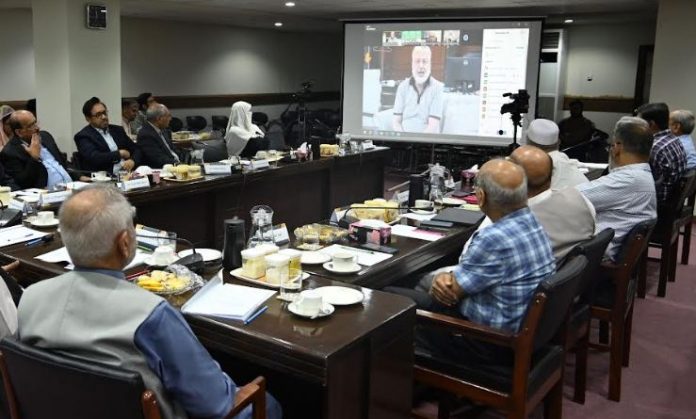ISLAMABAD, SEPT 22 (DNA) – Pakistan’s development trajectory is directly linked to the potential of its youth and the innovation within its education system. To fully harness this transformative power, education must be positioned at the heart of the national development strategy.
This approach, focused on reforms and empowerment, will allow Pakistan to cultivate future leaders, tackle emerging challenges, and assert itself as a global player. By embedding education into both national and international strategies, Pakistan can pave the way for a more sustainable and progressive future.
This was observed by a gathering of prominent academicians and educationists at the annual meeting of the National Advisory Council (NAC) of the Institute of Policy Studies (IPS), Islamabad. The speakers included Prof Dr Mukhtar Ahmed, chairman, Higher Education Commission (HEC), Prof Dr Anis Ahmad, vice chancellor, Riphah International University, Dr Asad Zaman, former vice chancellor Pakistan Institute of Development Economics (PIDE), Prof Jalil Aali, poet and educationist, Prof Dr Anwar ul Hassan Gilani, consultant with HEC and former vice chancellor, University of Haripur, Mufti Abdul Rahim, head of Jamia-tur-Rasheed, Karachi, and chancellor Al Ghazali University, Prof Dr Abdul Razzaq Sabir, vice chancellor, Gwadar University, Dr Syed Muhammad Junaid Zaidi, founder rector of COMSATS University, Islamabad, Dr Masood Mehmood Khan, senior lecturer, Curtin University, Australia, and Dr Noreen Saher, associate professor/chairperson, Department of Anthropology, IIUI. The forum was chaired by Khalid Rahman, chairman IPS, and moderated by Ambassador (r) Syed Abrar Hussain, vice chairman IPS.
The discussion emphasized that the nation’s progress is closely tied to an education system that is responsive to the challenges and opportunities of the modern age. The speakers underscored that universities and other educational institutions must undergo structural reforms to better equip youth with practical, forward-looking knowledge. This reform is crucial for positioning Pakistan to meet future challenges and thrive in an evolving global landscape.
The speakers expressed optimism about the current generation’s increased awareness and commitment, asserting that with the right educational environment, the youth can become powerful agents of transformation. However, there is a need to critically assess why previous constructive efforts have had limited impact.
To enable young people to act as catalysts for national development, the education system must provide them with platforms to develop their voices and contribute meaningfully to national discourse. This also involves the creation of democratic structures within political parties and the revival of platforms like student unions in a way that they serve as incubators for youth leadership and engagement.
In this way, education can also play a key role in building strategic resilience against disinformation and fifth-generation warfare. The speakers highlighted the importance of a unified national strategy to counter these threats through educating youth about national strengths and adversaries’ tactics.
Talking about the Islamization process of education, the discussion underscored the significance of aligning educational content and pedagogy with Islamic principles, ensuring that knowledge is not only acquired but also applied within an ethical and moral framework rooted in faith. This is crucial to fostering the holistic development of individuals who are intellectually competent, spiritually grounded, and socially responsible.
Furthermore, the speakers highlighted the necessity of conducting a comprehensive audit of Pakistan’s education system, from primary to higher levels, to ensure its alignment with the nation’s socio-economic realities. They stressed that the curriculum must be updated to reflect Pakistan’s developmental needs, equipping students with the practical skills required for global competitiveness.
Beyond these internal reforms, the speakers advocated for a broader vision of education as a tool for diplomacy. They called for civil society organizations and educational institutions to engage with counterparts in neighboring countries and beyond. This can be done by utilizing education to foster dialogue, address regional issues, and promote social development. Education diplomacy, they asserted, can be a vital instrument in shaping Pakistan’s relations with the wider world and ensuring that the voices of its youth are heard on international platforms.

















